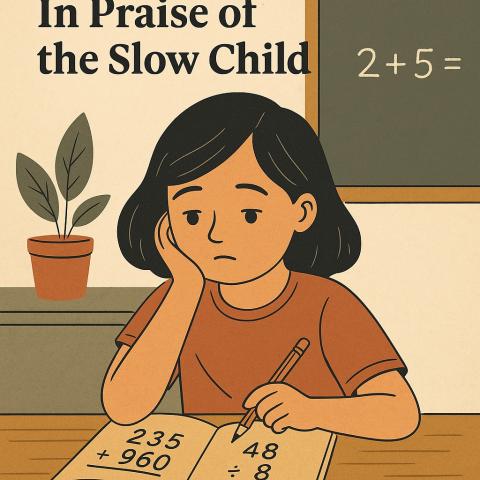
In Praise of the Slow Child
Recently, I attended a PTM, where the class teacher was supposed to meet 40 parents in 2 hours — that’s roughly 3 minutes for each parent. The class teacher had a bunch of marksheets indicating the marks scored by the child in each subject. Parents had a glance, enquired about why there were fewer marks in a particular subject, and the teacher advised some corrective measures. Parents signed the PTM attendance sheet, returned the marksheet, and the three minutes were over. I was wondering—how is it that the teacher has no story to tell about the child to her parents?
The mechanical setting of the school can be seen in every aspect. This is the reason most of us are schooled to see learning and living as separate phenomena. In the civilizational history of human beings, this was never the case. Learning was always about enriching lived experiences. In the naturalistic settings where there were no special institutions to teach learning, learning was an innate capacity—inevitable for survival. Children learned by being with the elder members of the family and community, observing them and engaging with them. The process was so natural that a child may not even realise when he/she acquired a particular skill or imbibed the beliefs and knowledge required to manoeuvre life within the given setting.
Of course, we live in a complex world, and naturalistic settings of learning, even if important, are not feasible now. Learning has to shift to a special institution called school. Now the question is: can school be naturalistic? In most cases, it cannot be. Modern life across the globe is the outcome of an industrialised world. Industries are based on the principles of consumption and production, and narratives are created to promote these two values as supreme values of human existence. In a very subtle form, we have been told that the more one possesses, the more value one has; similarly, the more one produces, the more one is celebrated. Some of the best-selling books are not the ones that teach love, compassion and harmony, but rather those that teach productivity hacks.
Schools operate under this larger narrative. And to prepare humans for the continuous cycle of production and consumption, it becomes important to mechanise the process—which ultimately deprives one of thinking. Thinking requires one to pause, delay, relax, feel disoriented, slow down… and all of these are projected as negative values.
The teacher’s complaint about a child was that she does math very slowly and thus her work remains incomplete. Some repeated comments by the teacher on the speed of her process, and she will acquire the belief that she can’t do math. I think millions of children are facing this dilemma across the globe. The smoke of mechanical learning is so dense that teachers are not able to see how they are killing the process of thinking in children. Hardly any student with great speed in solving sums becomes a thinker. It’s often the slow, lazy, and disoriented child who grows up to be a thought leader—only if they survive the schooling. We have several examples, including that of Edison and Tagore.
How can we prepare teachers to see the links between their practice and the larger value system they promote? I think people working with teachers need to think and work on this. Merely pedagogic skills to transact the given content are not enough. Teachers need to be prepared to locate their pedagogy within the larger socio-cultural phenomena. Only then can they truly devise their own pedagogy—one that promotes thinking in the child, which the teacher wants (at least in latency), but fails to see how the larger structure forces her to prepare children for the industry—children who can consume and produce without a question.
- Log in to post comments
